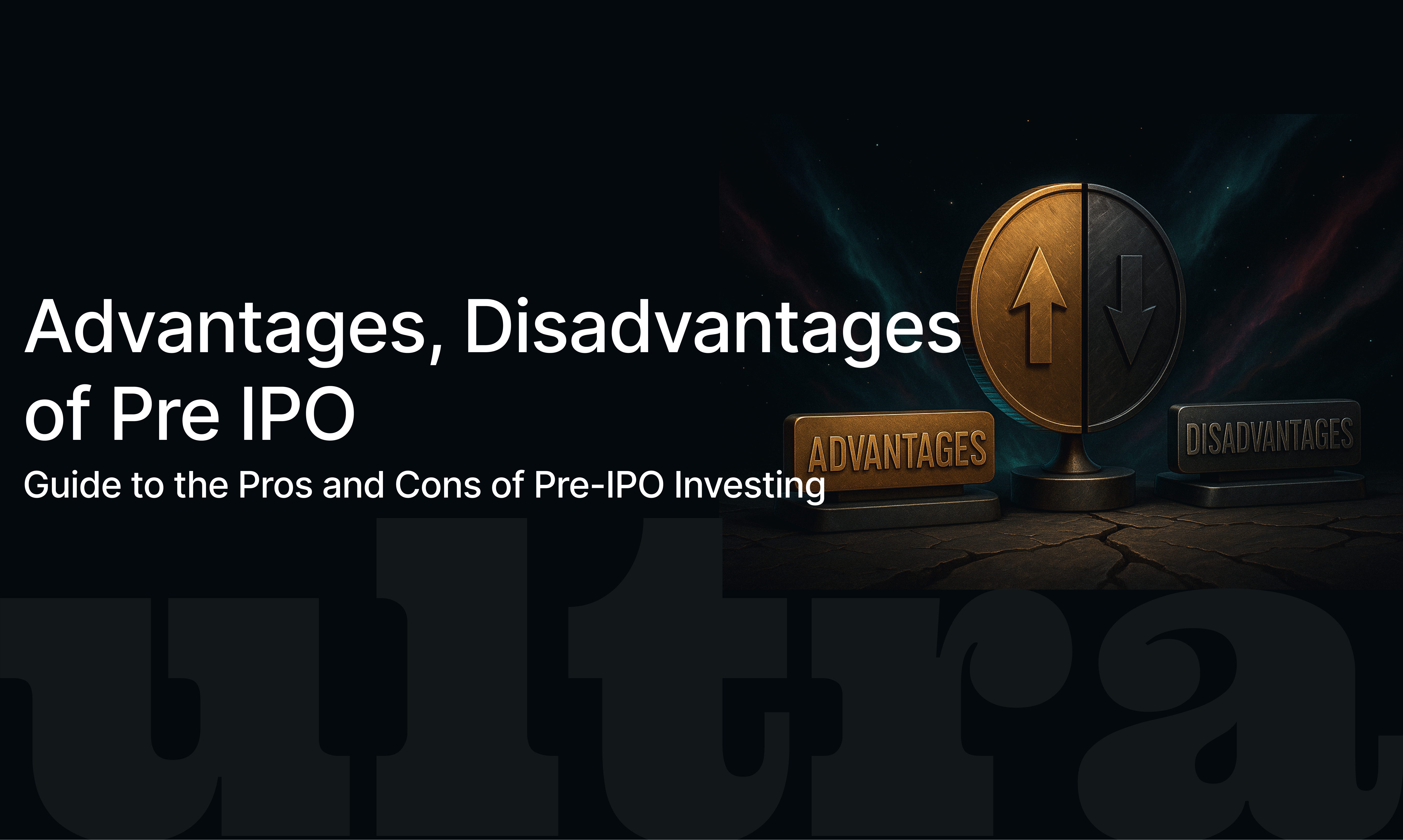Advantages, Disadvantages of Pre IPO
09 September 2025 · Sachin Gadekar
A Complete Guide to the Pros and Cons of Pre-IPO Investing

What is Pre-IPO Investing?
Investors are always looking for opportunities that offer higher returns and diversification. One such opportunity that has gained traction in recent years is pre-IPO investing. This involves buying shares of a company before it becomes publicly listed on a stock exchange. While the potential for high returns is attractive, there are also unique risks that investors must understand before venturing into this space.
In this article, we will explore the advantages, disadvantages of pre-IPO investing, and evaluate whether it suits your investment strategy.
Pre-IPO investing refers to purchasing company shares before they are officially listed on a stock exchange. These shares are typically offered to venture capitalists, private equity firms, high-net-worth individuals, and now, increasingly, through digital platforms like ultra that provide wider access to retail investors.
Since these investments happen in the private stage of a company, they can offer significant growth potential—but they also carry risks due to limited liquidity and uncertainty around IPO timing.
Advantages of Pre-IPO Investing
Here are some key pre-IPO investing benefits:
1. Potential for High Returns
Investors can purchase shares at lower valuations compared to post-IPO prices. If the company performs well after listing, early investors can enjoy substantial capital appreciation.
2. Early Access to Promising Companies
Pre-IPO investments allow you to be part of a company’s growth story before it becomes widely available to the public. This is especially valuable in high-growth sectors like fintech, technology, and healthcare.
3. Portfolio Diversification
Adding pre-IPO shares can diversify your investment portfolio by including private equity exposure, which typically behaves differently from listed stocks.
4. Access to Exclusive Opportunities
Traditionally reserved for institutional investors, pre-IPO shares are now available to individuals through platforms like Ultra, giving retail investors access to once-exclusive opportunities.
Disadvantages of Pre-IPO Investing
Despite the benefits, there are important cons of pre-IPO investing to consider:
1. Liquidity Risk
Unlike listed shares, pre-IPO shares cannot be easily sold on the market. Investors may have to wait until the IPO or an exit event to liquidate their investment.
2. Uncertainty of IPO
There’s no guarantee that the company will eventually go public. If an IPO is delayed or canceled, investors might face extended holding periods.
3. Lack of Transparency
Private companies are not required to disclose financial details publicly. This makes it harder to assess their true valuation and growth potential.
4. Higher Risk of Loss
Since pre-IPO companies are often still in their growth phase, the risk of business failure is higher compared to established public companies.
Pros and Cons of Pre-IPO Investing
| Pros | Cons |
|---|---|
| High return potential | Liquidity challenges |
| Early access to growth companies | Uncertainty around IPO timing |
| Portfolio diversification | Limited financial transparency |
| Access to exclusive opportunities | Higher risk of business failure |
Should You Invest in Pre-IPO Shares?
Pre-IPO investing can be rewarding, but it is not suitable for every investor. It works best for individuals with:
A higher risk tolerance
A long-term investment horizon
Interest in exposure to private equity opportunities
For investors seeking safer, more liquid investments, traditional stocks or bonds may be more appropriate. However, those willing to take calculated risks may find pre-IPO investing a valuable addition to their portfolios.
Platforms like Ultra are bridging the gap by offering investors access to such opportunities with transparency and convenience.
Conclusion
Pre-IPO investing is a unique opportunity that comes with both rewards and risks. While the advantages of pre-IPO investing include higher return potential and access to exclusive opportunities, the disadvantages—such as liquidity risks and uncertainty—cannot be overlooked.
If approached with proper research, risk management, and the right platform, pre-IPO investing can enhance your investment portfolio. ultra offers investors access to multiple investment opportunities and unlisted shares, making it easier to explore this dynamic segment of the market.
FAQs
1. What are the advantages of pre-IPO investing?
Pre-IPO investing offers high return potential, early access to companies, portfolio diversification, and access to exclusive opportunities.
2. What are the disadvantages of pre-IPO investing?
The main drawbacks are liquidity risks, uncertainty about IPO timelines, lack of transparency, and higher risk of loss.
3. Is pre-IPO investing safe?
It involves higher risks than traditional investments, as private companies are less regulated and their IPO success is uncertain.
4. Who can invest in pre-IPO shares?
Earlier, only institutional investors had access. Now, retail investors can participate through digital investment platforms like Ultra.
5. How long should I hold pre-IPO shares?
Holding periods can vary, but investors should be prepared for long-term horizons until the company lists publicly or provides an exit.